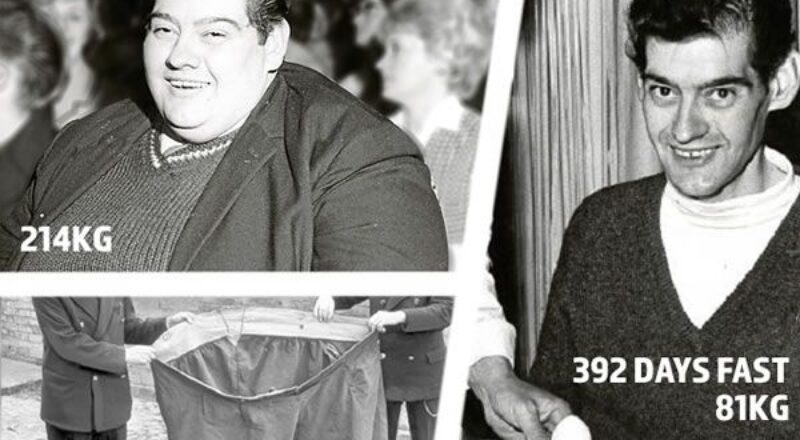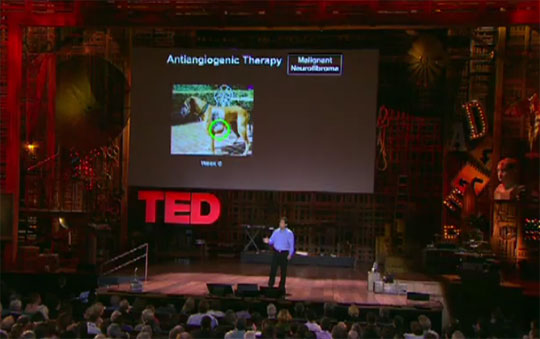
In 1965, 27-year-old Angus Barbieri checked himself into the Maryfield Hospital in Scotland. He complained to the doctor that he was too obese. He weighed 456 lbs or 207 kg. Barbieri’s doctors suggested for him to start fasting, presumably in the hope that his stomach would shrink, reducing his appetite and his capacity for food. Astonishingly Barbieri was having no trouble starving himself, so he decided to continue fasting with the doctor’s supervision.
Barbieri’s doctors prescribed a new diet of non-caloric fluids, vitamin/mineral supplements, electrolytes, and yeast. The man continued with this arrangement and periodically doing urine tests. Barbieri continued to fast as per recommended 40 days, and surprisingly continued even after that. His blood and urine tests showed some variations, there was nothing to worry about according to the doctors. The patient’s bowel movements became quite infrequent, with an average of 42 days between evacuations.
Barbieri celebrated the end of his self-imposed starvation with a breakfast of one boiled egg, a slice of buttered bread, and a cup of black coffee. He had not eaten for 382 days any solid foods, and in that time he lost 276 pounds or 125 kg. He went from 456 lbs to 180 lbs, or from 207 kg to 82 kg. During his fast he lost an average of 12 ounces per day or a third of a kilo per day. Doctors noted no ill effects from the prolonged starvation. The Guinness Book of Records credited Barbieri’s 382-day fast as the longest a person had gone without solid food. Barbieri did not gain his weight back over the years and remained in a healthy weight range, he died in 1990.
According to the laws of physics, more particularly the law of conservation of mass, matter cannot be created or destroyed. Therefore humans must expel matter from their body if they wish to lose weight. Surprisingly a survey which asked actual health professionals how they believed the body gets rid of metabolized fat, most health professionals answered incorrectly. The majority of them assumed that “burned” fat is converted into energy or heat and they also believed that metabolites are converted into muscle or expelled as feces. In reality and much to the surprise to the health professionals over 90% of lost weight leaves the body as carbon dioxide, exhaled from the lungs, disappearing into thin air. The rest is lost in urine, sweat and other fluids.
Barbieri’s feat might be a surprise to the modern man but it is not a surprise to the ancient world. Fasting is a custom practice followed by all religions and it is as old as our history. Even science is now agreeing with ancient traditions. Several studies have found that fasting may improve blood sugar control, which could be especially useful for those at risk of diabetes. Some studies have found that fasting can help decrease levels of inflammation and help promote better health. One study in 50 healthy adults showed that intermittent fasting for one month significantly decreased levels of inflammatory markers. Though research is mostly limited to animal research, several studies have found that fasting could have a powerful effect on brain health.
One study in mice showed that practicing intermittent fasting for 11 months improved both brain function and brain structure. Additionally, fasting has shown Increase in Growth Hormone Secretion, Which Is Vital for Growth, Metabolism, Weight Loss and Muscle Strength. Fasting could also help with aging. Several animal studies have found promising results on the potential lifespan-extending effects of fasting.
In one study, rats that fasted every other day experienced a delayed rate of aging and lived 83% longer than rats that didn’t fast. All of those claims seem surrealistic but they can all be verified. Barbieri might not have known of all those benefits but he is living proof of benefits of fasting.
This was our take on the story of Barbieri and his amazing fast, please comment on our video and tell us your fasting experience. Don’t forget to like and subscribe to our High Tech channel.



